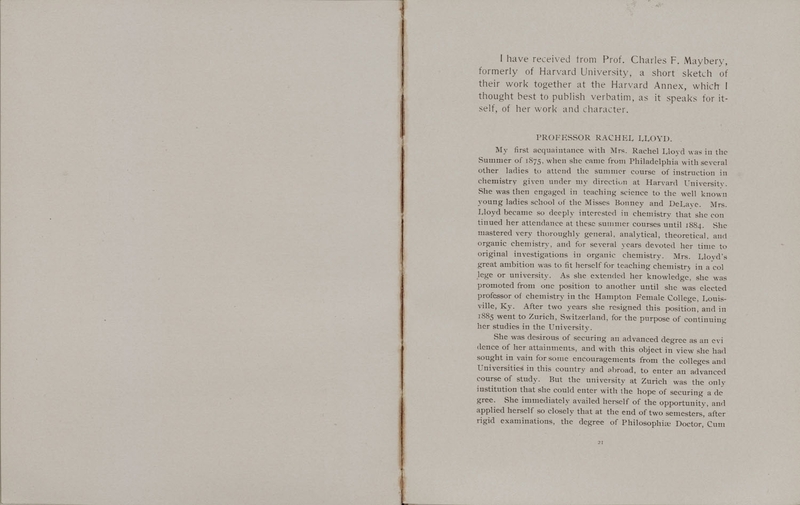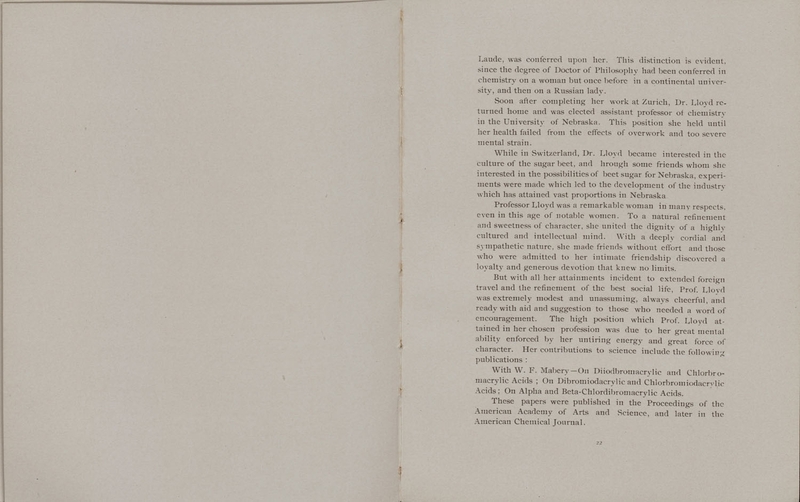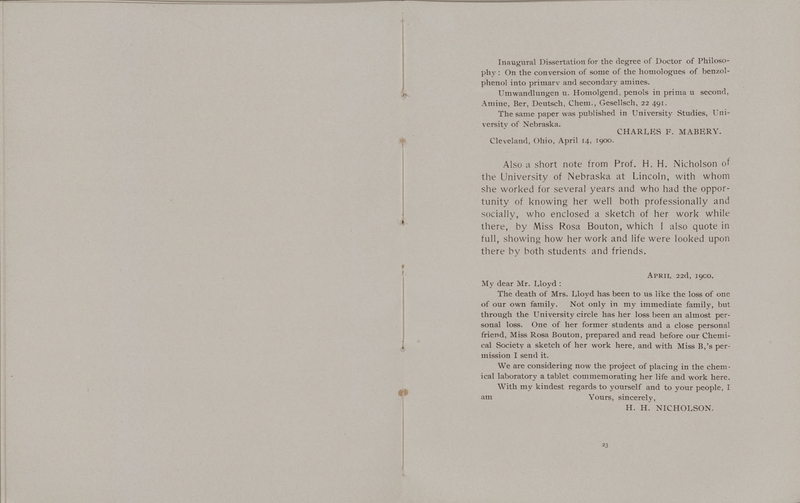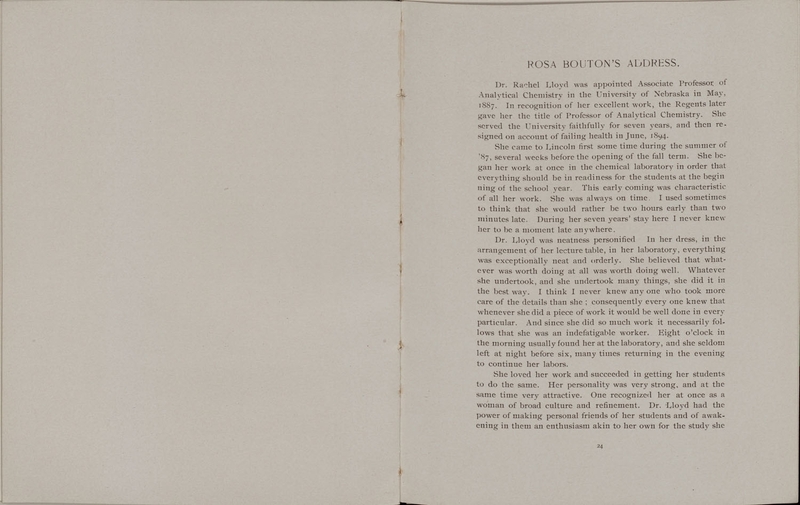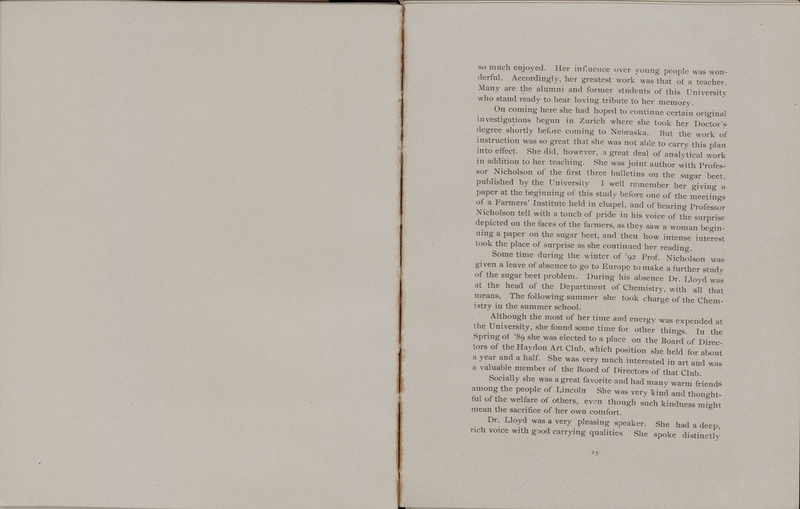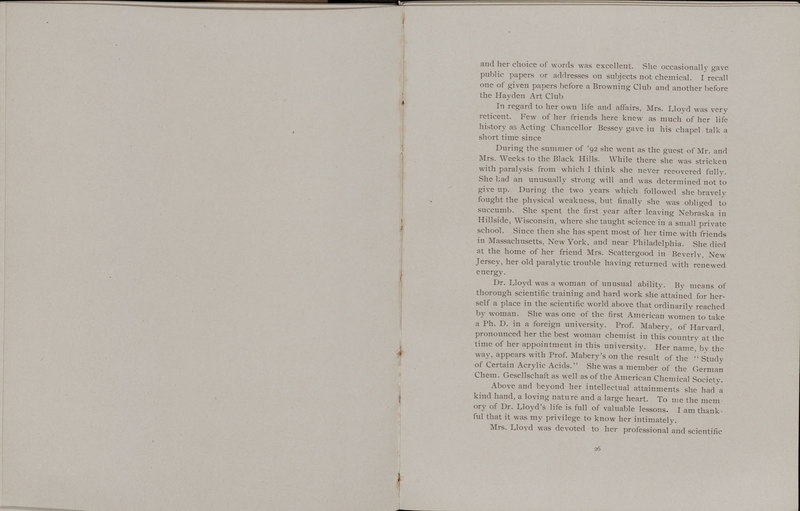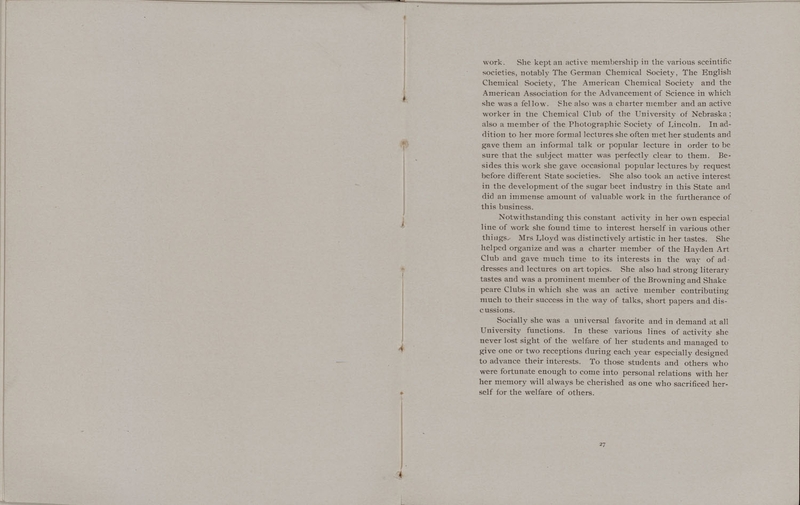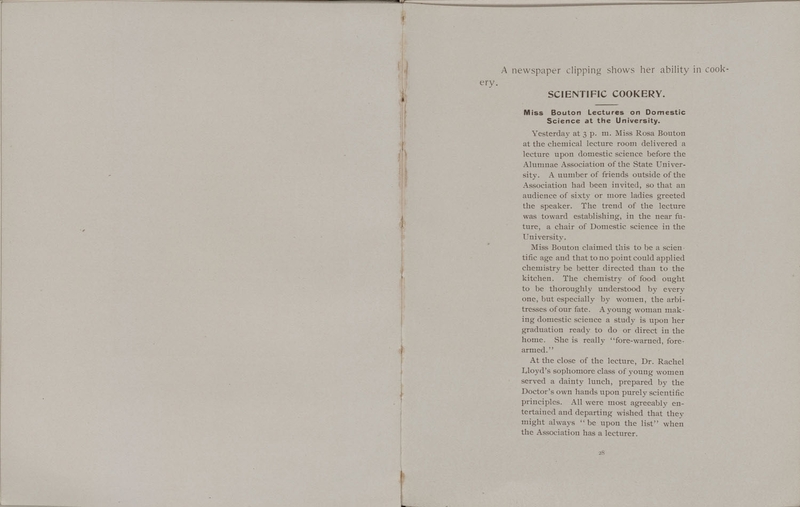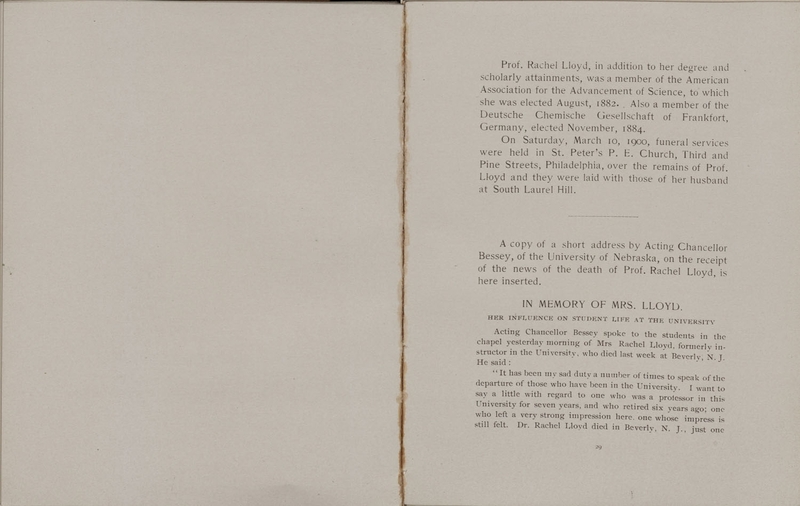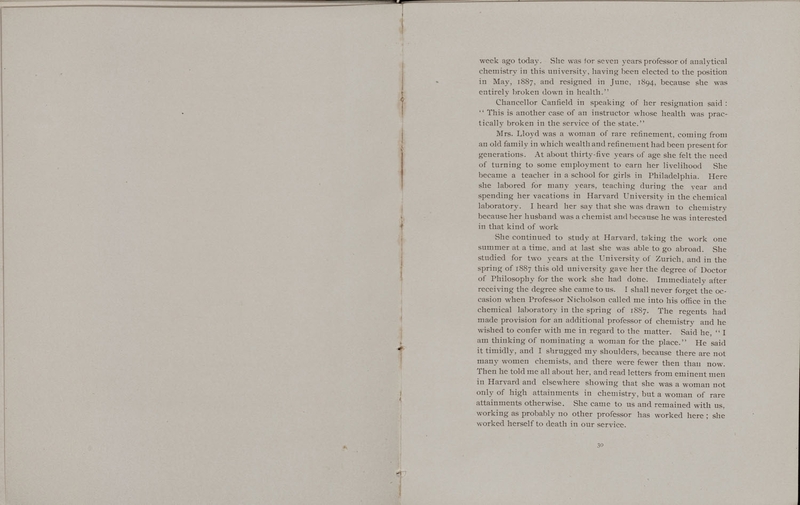I have received from Prof. Charles F. Maybery, formerly of Harvard University, a short sketch of their work together at the Harvard Annex, which I thought best to publish verbatim, as it speaks for itself, of her work and character.
PROFESSOR RACHEL LLOYD.
My first acquaintance with Mrs. Rachel Lloyd was in the Summer of 1875, when she came from Philadelphia with several other ladies to attend the summer course of instruction in chemistry given under my direction at Harvard University. She was then engaged in teaching science to the well known young ladies school of the Misses Bonney and DeLaye. Mrs. Lloyd became so deeply interested in chemistry that she continued her attendance at these summer courses until 1884. She mastered very thoroughly general, analytical, theoretical, and organic chemistry, and for several years devoted her time to original investigations in organic chemistry. Mrs. Lloyd's great ambition was to fit herself for teaching chemistry in a college or university. As she extended her knowledge, shc was promoted from one position to another until she was elected professor of chemistry in the Hampton Female College, Louisville, Ky. After two years she resigned this position, and in 1885 went to Zurich, Switzerland, for the purpose of continuing her studies in the University.
She was desirous of securing an advanced degree as an evidence of her attainments, and with this object in view she had sought in vain for some encouragements from the colleges and Universities in this country and ahroad, to enter an advanced course of study. But the university at Zurich was the only institution that she could enter with the hope of securing a degree. She immediately availed herself of the opportunity, and applied herself so closely that at the end of two semesters, after rigid examinations, the degree of Philosophiae Doctor, Cum
Laude, was conferred upon her. This distinction is evident, since the degree of Doctor of Philosophy had been conferred in chemistry on a woman but once before in a continental university, and then on a Russian lady.
Soon after completing her work at Zurich, Dr. Lloyd returned home and was elected assistant professor of chemistry in the University of Nebraska. This position she held until her health failed from the effects of overwork and too severe mental strain.
While in Switzerland, Dr. Lloyd became interested in the culture of the sugar beet, and [t]hrough some friends whom she interested in the possibilities of beet sugar for Nebraska, experiments were made which led to the development of the industry which has attained vast proportions in Nebraska[.]
Professor Lloyd was a remarkable woman in many respects, even in this age of notable women. To a natural refinement and sweetness of character, she united the dignity of a highly cultured and intellectual mind. With a deeply cordial and sympathetic nature, she made friends without effort and those who were admitted to her intimate friendship discovered a loyalty and generous devotion that knew no limits.
But with all her attainments incident to extended foreign travel and the refinement of the best social life, Prof. Lloyd was extremely modest and unassuming, always cheerful, and ready with aid and suggestion to those who needed a word of encouragement. The high position which Prof. Lloyd attained in her chosen profession was due to her great mental ability enforced hy her untiring energy and great force of character. Her contributions to science include the following publications:
With W.F. Mabery — On Diiodbromacrylic and Chlorbromacrylic Acids; On Dibromiodacrylic and Chlorbromiodacrylic Acids; On Alpha and Beta-Chlordibromacrylic Acids.
These papers were published in the Proceedings of the American Academy of Arts and Science, and later in the American Chemical Journal.
Inaugural Dissertation for the degree of Doctor of Philosophy: On the conversion of some of the homologues of benzolphenol into primary and secondary amines.
Umwandlungen u. Homolgend. penols in prima u second, Amine, Ber, Deutsch, Chem, Gesellsch, 22 491.
The same paper was published in University Studies, University of Nebraska.
CHARLES F. MABERY.
Also a short note from Prof. H. H. Nicholson of the University of Nebraska at Lincoln, with whom she worked for several years and who had the opportunity of knowing her well both professionaliy and socially, who enclosed a sketch of her work while there, by Miss Rosa Bouton, which I also quote in full, showing how her work and life were looked upon there by both students and friends.
April 22d, 1900. My dear Mr. Lloyd:
The death of Mrs. Lloyd has been to us like the loss of one of our own family. Not only in my immediate family, but through the University circle has her loss been an almost personal loss. One of her former students and a close personal friend, Miss Rosa Bouton, prepared and read before our Chemical Society a sketch of her work here, and with Miss B,'s permission I send it.
We are considering now the project of placing in the chemical laboratory a tablet commemorating her life and work here.
With my kindest regards to yourself and to your people, I am
Your, sincerely
H. H. NICHOLSON.
ROSA BOUTON'S ADDRESS.
Dr. Rachel Lloyd was appointed Associate Professor of Analytical Chemistry in the University of Nebraska in May, 1887. In recognition of her excellent work, the Regents later gave her the title of Professor of Analytical Chemistry. She served the University faithfully for seven years, and then resigned on account of failing health in June, 1894.
She came to Lincoln first some time during the summer of '87, several weeks before the opening of the fall term. She began her work at once in the chemical laboratory in order that everything should be in readiness for the students at the beginning of the school year. This early coming was characteristic of all her work. She was always on time. I used sometimes to think that she would rather be two hours early than two minutes late. During her seven years' stay here I never knew her to be a moment late anywhere.
Dr. Lloyd was neatness personified[.] In her dress, in the arrangement of her lecture table, in her laboratory, everything was exceptionally neat and orderly. She believed that whatever was worth doing at all was worth doing well. Whatever she undertook, and she undertook many things, she did it in the best way. I think I never knew anyone who took more care of the details than she; consequently everyone knew that whenever she did a piece of work it would be well done in every particular. And since she did so much work it necessarily follows that she was an indefatigable worker. Eight o'clock in the morning usually found her at the laboratory, and she seldom left at night before six, many times returning in the evening to continue her labors.
She loved her work and succeeded in getting her students to do the same. Her personality was very strong, and at the same time very attractive. One recognized her at once as a woman of broad culture and refinement. Dr. Lloyd had the power of making personal friends of her students and of awakening in them an enthusiasm akin to her own for the study she
so much enjoyed. Her influence over young people was wonderful. Accordingly, her greatest work was that of a teacher. Many are the alumni and former students of this University who stand ready to bear loving tribute to her memory.
On coming here she had hoped to continue certain original investigations begun in Zurich where she took her Doctor's degree shortly before coming to Nebraska. But the work of instruction was so great that she was not able to carry this plan into effect. She did, however, a great deal of analytical work in addition to her teaching. She was joint author with Professor Nicholson of the first three bulletins on the sugar beet, published by the University[.] I well remember her giving a paper at the beginning of this study before one of the meetings of a Farmers' Institute held in chapel, and of hearing Professor Nicholson tell with a touch of pride in his voice of the surprise depicted on the faces of the farmers, as they saw a woman beginning a paper on the sugar beet, and then how intense interest took the place of surprise as she continued her reading.
Some time during the winter of '92 Prof. Nicholson was given a leave of absence to go to Europe to make a further study of the sugar beet problem. During his absence Dr. Lloyd was at the head of the Department of Chemistry, with all that means, The following summer she took charge of the Chemistry in the summer school.
Although the most of her time and energy was expended at the University, she found some time for other things. In the Spring of '89 she was elected to a place on the Board of Directors of the Haydon Art Club, which position she held for about a year and a half. She was very much interested in art and was a valuable member of the Board of Directors of that Club.
Socially she was a great favorite and had many warm friends among the people of Lincoln[.] She was very kind and thoughtful of the welfare of others, even though such kindness might mean the sacrifice of her own comfort.
Dr. Lloyd was a very pleasing speaker. She had a deep, rich voice with good carrying qualities[.] She spoke distinctly
and her choice of words was excellent. She occasionally gave public papers or addresses on subjects not chemical. I recall one of given papers before a Browning Club and another before the Hayden Art Club[.]
In regard to her own life and affairs, Mrs. Lloyd was very reticent. Few of her friends here knew as much of her life history as Acting Chancellor Bessey gave in his chapel talk a short time since[.]
During thc summer of '92 she went as the guest of Mr. and Mrs. Weeks to the Black Hills. While there she was stricken with paralysis from which I think she never recovered fully. She had an unusually strong will and was determined not to give up. During the two years which followed she bravely fought the physical weakness, but finally she was obliged to succumb. Shc spent the first year after leaving Nebraska in Hillside, Wisconsin, where she taught science in a small private school. Since then she has spent most of her time with friends in Massachusetts, New York, and near Philadelphia. She died at the home of her friend Mrs. Scattergood in Beverly, New Jersey, her old paralytic trouble having returned with renewed energy.
Dr. Lloyd was a woman of unusual ability. By means of thorough scientific training and hard work she attained for herself a place in the scientific world above that ordinarily reached by woman. She was one of the first American women to take a Ph. D. in a foreign university. Prof. Mabery, of Harvard, pronounced her the best woman chemist in this country at the time of her appointment in this university. Her name, by the way, appears with Prof. Mabery's on the result of the "Study of Certain Acrylic Acids." She was a member of the German Chem. Gesellschaft as well as of the American Chemical Society.
Above and beyond her intellectual attainments she had a kind hand, a loving nature and a large heart. To me the memory of Dr. Lloyd's life is full of valuable lessons. I am thankful that it was my privilege to know her intimately.
Mrs. Lloyd was devoted to her professional and scientific
work. She kept an active membership in the various sceintificscientific societies, notably The German Chemical Society, The English Chemical Society, The American Chemical Society and the American Association for the Advancement of Science in which she was a fellow. She also was a charter member and an active worker in the Chemical Club of the University of Nebraska; also a member of the Photographic Society of Lincoln. In addition to her more formal lectures she often met her students and gave them an informal talk or popular lecture in order to be sure that the subject matter was perfectly clear to them. Besides this work she gave occasional popular lectures by request before different State societies. She also took an active interest in the development of the sugar beet industry in this State and did an immense amount of valuable work in the furtherance of this business.
Notwithstanding this constant activity in her own especial line of work she found time to interest herself in various other things. Mrs Lloyd was distinctively artistic in her tastes. She helped organize and was a charter member of the Hayden Art Club and gave much time to its interests in the way of addresses and lectures on art topics. She also had strong literary tastes and was a prominent member of the Browning and Shakepeare Clubs in which she was an active member contributing much to their success in the way of talks, short papers and discussions.
Socially she was a universal favorite and in demand at all University functions. In these various lines of activity she never lost sight of the welfare of her students and managed to give one or two receptions during each year especially designed to advance their interests. To those students and others who were fortunate enough to come into personal relations with her her memory will always be cherished as one who sacrificed herself for the welfare of others.
A newspaper clipping shows her ability in cookery.
SCIENTIFIC COOKERY.
Miss Bouton Lectures on Domestic Science at the University.
Yesterday at 3 p. m. Miss Rosa Bouton at the chemical lecture room delivered a lecture upon domestic science before the Alumnae Association of the State University. A number of friends outside of the Association had been invited, so that an audience of sixty or more ladies greeted the speaker. The trend of the lecture was toward establishing, in the near future, a chair of Domestic science in the University.
Miss Bouton claimed this to be a scientific age and that to no point could applied chemistry be better directed than to the kitchcn. The chemistry of food ought to be thoroughly understood by every one, but especially by women, the arbitresses of our fate. A young woman making domestic science a study is upon her graduation ready to do or direct in the home. She is really "fore-warned, fore-armed."
At the close of the lecture, Dr. Rachel Lloyd's sophomore class of young women served a dainty lunch, prepared by the Doctor's own hands upon purely scientific principles. All were most agreeably entertained and departing wished that they might always "be upon the list" when the Association has a lecturer.
Prof. Rachel L1oyd, in addition to her degree and scholarly attainments, was a member of the American Association for the Advancement of Science, to which she was elected August, 1882. Also a member of the Deutsche Chemische Gesellschaft of Frankfort, Germany, elected November, 1884.
On Saturday, March 10, 1900, funeral services were held in St. Peter's P. E. Church, Third and Pine Streets, Philadelphia, over the remains of Prof. Lloyd and they were laid with those of her husband at South Laurel Hill.
A copy of a short address by Acting Chancellor Bessey, of the University of Nebraska, on the receipt of the news of the death of Prof. Rachel Lloyd, is here inserted.
IN MEMORY OF MRS. LLOYD.
HER INFLUENCE ON STUDENT LIFE AT THE UNIVERSITY
Acting Chancellor Bessey spoke to the students in the chapel yesterday morning of Mrs[.] Rachel Lloyd, formerly instructor in the University, who died last week at Beverly, N.J.
He said:
"It has been my sad duty a number of times to speak of the departure of those who have been in the University. I want to say a little with regard to one who was a professor in this University for seven yeras, and who retired six years ago; one who left a very strong impression here, one whose impress is still felt. Dr. Rachel Lloyd died in Beverly, N.J., just one
week ago today. She was for seven years professor of analytical chemistry in this university, having been electcd to the position in May, 1887, and resigned in June, 1894, because she was entirely broken down in health."
Chancellor Canfield in speaking of her resignation said: "This is another case of an instructor whose health was practically broken in the service of the state."
Mrs. Lloyd was a woman of rare refinement, coming from an old family in which wealth and refinement had been present for generations. At about thirty-five years of age she felt the need of turning to some employment to earn her livelihood[.] She became a teacher in a school for girls in Philadelphia. Here she labored for many years, teaching during the year and spending her vacations in Harvard University in the chemical laboratory. I hcard her say that she was drawn to chemistry because her husband was a chemist and bccause he was interested in that kind of work[.]
She continued to study at Harvard, taking the work one summer at a time, and at last she was able to go abroad. She studied for two years at the University of Zurich, and in thc spring of 1887 this old university gave her the degree of Doctor of Philosophy for the work she had done. Immediately after receiving the degree she came to us. I shall never forget the occasion when Professor Nicholson called me into his office in the chemical laboratory in the spring of 1887. The regents had made provision for an additional professor of chemistry and he wished to confer with me in regard to the matter. Said he, "I am thinking of nominating a woman for the place." He said it timidly, and I shrugged my shoulders, because there are not many women chemists, and there were fewer then than now. Then he told me all about her, and read letters from eminent men in Harvard and elsewhere showing that she was a woman not only of high attainments in chemistry, but a woman of rare attainments otherwise. She came to us and remained with us, working as probably no other professor has worked here; she worked herself to death in our service.

